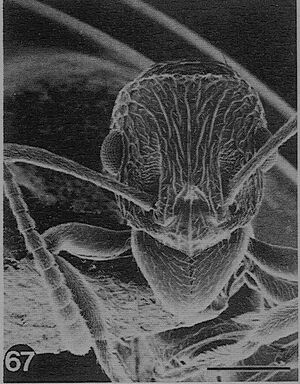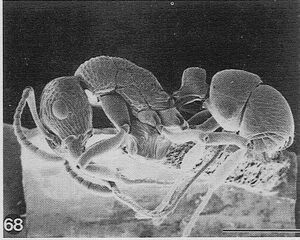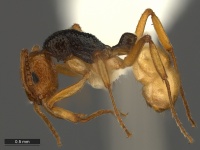Rhytidoponera mimica
Rhytidoponera mimica is a striking orange and black ant that is an apparent Mullerian mimic of Camponotus irritans croceomaculatus. Both forage on low vegetation.
| Rhytidoponera mimica | |
|---|---|

| |
| Scientific classification | |
| Kingdom: | Animalia |
| Phylum: | Arthropoda |
| Class: | Insecta |
| Order: | Hymenoptera |
| Family: | Formicidae |
| Subfamily: | Ectatomminae |
| Tribe: | Ectatommini |
| Genus: | Rhytidoponera |
| Species: | R. mimica |
| Binomial name | |
| Rhytidoponera mimica Ward, 1984 | |
Identification
Workers of Rhytidoponera mimica have a unique and divergent coloration pattern among the New Caledonian Rhytidoponera. The conspicuous orange and black pattern is shared with workers of a sympatric foliage-foraging Camponotus irritans croceomaculatus Emery. This may be a case of Mullerian, rather than Batesian, mimicry since: 1) Rhytidoponera workers can inflict a painful sting; 2) elsewhere in New Caledonia, Rhytidoponera species with a conspicuous shiny gaster, such as Rhytidoponera versicolor, appear to be mimicked by various foliage-frequenting arthropods.
Coloration aside, Rhytidoponera mimica may be distinguished from other congeners by the combination of small size (HW < 0.95 mm), absence of erect pilosity from the propodeum and upper surfaces of the femora, and absence of dense pubescence on the shiny gastric tergites.
Distribution
Latitudinal Distribution Pattern
Latitudinal Range: -20.29999924° to -20.3°.
| North Temperate |
North Subtropical |
Tropical | South Subtropical |
South Temperate |
- Source: AntMaps
Distribution based on Regional Taxon Lists
Australasian Region: New Caledonia (type locality).
Distribution based on AntMaps
Distribution based on AntWeb specimens
Check data from AntWeb
Countries Occupied
| Number of countries occupied by this species based on AntWiki Regional Taxon Lists. In general, fewer countries occupied indicates a narrower range, while more countries indicates a more widespread species. |

|
Estimated Abundance
| Relative abundance based on number of AntMaps records per species (this species within the purple bar). Fewer records (to the left) indicates a less abundant/encountered species while more records (to the right) indicates more abundant/encountered species. |

|
Biology
Rhytidoponera mimica was collected in a small patch of gully rainforest, 300 meters elevation, surrounded by niaouli (Melaleuca scrub). Workers were foraging on low vegetation. Two nests were located, both in vertical banks of soil beside a stream.
Castes
Known only from workers.
Worker
   
| |
| . | |
Nomenclature
The following information is derived from Barry Bolton's Online Catalogue of the Ants of the World.
- mimica. Rhytidoponera mimica Ward, 1984: 163, figs. 67, 68, 73, 74 (w.) NEW CALEDONIA.
- Type-material: holotype worker, paratype workers (number not stated).
- Type-locality: holotype New Caledonia: Col d’Amoss, 300 m., 20°18’S, 164°25’E, 3.v.1980, acc. no. 4215-1, on low vegetation, gully rainforest (P.S. Ward); paratypes with same data but acc. nos 4215-1, 4216, 4217 (P.S. Ward).
- Type-depositories: ANIC (holotype); ANIC, BMNH, BPBM, MCZC, MNHN, PSWC (paratypes).
- Status as species: Taylor, 1987a: 72; Bolton, 1995b: 380.
- Distribution: New Caledonia.
Type Material
- Holotype, worker, Col d'Amoss, New Caledonia, Ward,P., ANIC32-017945, Australian National Insect Collection.
- Paratype, 1 worker, Col d'Amoss, New Caledonia, Ward,P., ANIC32-017946, Australian National Insect Collection.
- Paratype, 1 worker, Col d'Amoss, New Caledonia, Ward,P., ANIC32-017948, Australian National Insect Collection.
- Paratype, 1 worker, Col d'Amoss, New Caledonia, Ward,P., ANIC32-017949, Australian National Insect Collection.
- Paratype, 2 workers, Col d'Amoss, New Caledonia, The Natural History Museum.
- Paratype, 2 workers, Col d'Amoss, New Caledonia, PSWC#4217, Museum of Comparative Zoology.
Description
Type Material
Holotype worker. New Caledonia: Col d'Amoss, 300 m. 20°18′0″S 164°25′0″E / 20.3°S 164.416667°E 3.v.1980, foraging on low vegetation, gully rainfores (P.S. Ward acc. No. 4215-1) (ANIC Type No. 7586).
Paratype workers. A series of 3 accessions from the type locality, same date (P.S. Ward acc. Nos 4215-1, 4216, 4217) (ANIC,BPBM, BMNH, MCZC, MNHN, PSW).
Measurements
Holotype worker. HW 0.9, WL 1.34, CI 0.88, MI 0.40, SI 1.06, SL12 0.18, SSC 0, FSC 0.
Paratype workers (n = 9) HW 0.86 - 0.92, WL 1.22 - 1.34, CI 0.87 - 0.90, MI 0.36 - 0.44, SI 0.99 - 1.07, SL12 0.15 - 0.18, SSC 0-1, FSC 0.
Diagnosis of Worker
Similar to Rhytidoponera insularis in relative body dimensions and sculpture. Anterior clypeal margin more sharply angulate. Petiole with a relatively high, narrow node (LPI 0.45 - 0.49; DNI 0.86 - 0.90; PN12 0.39 - 0.43), and with a conspicuous anterior peduncle and a slender, spine-like subpetiolar process (SPI 0.13 - 0.18). Head rugose to longitudinally rugostriate, the inter-rugal spaces shining. Mesosoma rugose to transversely rugostriate, the rugae weak and interspaces smooth and shining. Anepisternum largely smooth and shining, and devoid of sculpture centrally except for 2 or 3 punctures. Abdominal tergites III and IV shining, with weak striolate sculpture which is posteromedially obsolete. Gastric tergites with appressed hairs moderately dense, separated by about their lengths. Eerect setae relatively sparse on most parts of the body, generally lacking on the propodeum and upper surfaces of the scapes and femora. Mesosoma and petiole dark brown to black; head a contrasting light ferrugineous brown; gaster, legs (including coxae) and mandibles a paler luteous brown, contrasting strongly with the mesosoma.
References
References based on Global Ant Biodiversity Informatics
- CSIRO Collection
- Jennings J. T., L. Krogmann, and C. Burwell. 2013. Review of the hymenopteran fauna of New Caledonia with a checklist of species. Zootaxa 3736(1): 1-53.
- Taylor R. W. 1987. A checklist of the ants of Australia, New Caledonia and New Zealand (Hymenoptera: Formicidae). CSIRO (Commonwealth Scientific and Industrial Research Organization) Division of Entomology Report 41: 1-92.
- Ward P. S. 1984. A revision of the ant genus Rhytidoponera (Hymenoptera: Formicidae) in New Caledonia. Aust. J. Zool. 32: 131-175.
- Ward P. S. 1985. Taxonomic congruence and disparity in an insular ant fauna: Rhytidoponera in New Caledonia. Systematic Zoology 34: 140-151.

